Building a Healthier Society Through Nutrition Education
Teaching children healthy nutrition is not an easy task when the unhealthy options that exist are backed by huge marketing budgets to increase their appeal. One school has discovered that one way to change a child’s mind about eating healthy is to include healthy eating habits in their daily routine. That’s what Stella Maris School is doing with “Fruity Tuesdays” and “Water Wednesdays” initiatives. And that approach works in tandem with a regional campaign to eliminate the region’s most deadly food product, trans fat. Teaching children to eat healthy empowers them to avoid food options that can lead to non-communicable diseases. News Five’s Paul Lopez tells us more in this week’s installment of Belize on Reel.
 Paul Lopez, Reporting
Paul Lopez, Reporting
A healthy, nutritious diet is essential to a child’s physical and mental well-being. This is one of the reasons why the Ministry of Health and Wellness launched the “Healthy Habits, Healthy Schools, Healthy Belize” campaign. Stella Maris School adopted the program.

Sheree Salgado
Sheree Salgado, Teacher, Stella Maris School
“As a staff we came up with different activities we can do. On Tuesdays we have what we call fruity Tuesday. Parents are encouraged to send their child with a fruit. That day we don’t want any chips, any biscuits. So, you will that the classes will do different activities with the fruits. On Wednesdays we do a water Wednesday. We don’t want to see any ideals, any juice. So, student and teachers are encouraged to drink water on Wednesdays.”
These two students at Stella Maris School are busy at work, preparing their plate of fruits for a midday snack. They are encouraged to bring their own fruits and to get involved in the cutting up the fruits, while they learn to identify each one. As a school for children living with various disabilities, too much sugary drinks and snacks can prove counterproductive.
Teacher
“What is this?”
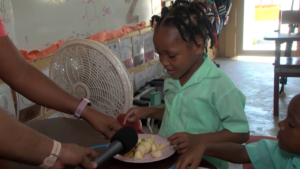
Student #1
Student #1
“Grapes”
Teacher
“And this one?”
Student #1
“Apple”
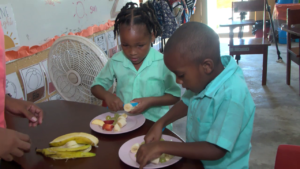 Teacher
Teacher
“And this one?”
Student #1
“Banana”
Teacher
“What is this one?”
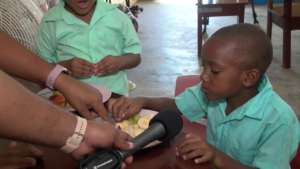
Student #2
Student #2
“Banana, Apple.”
Teacher
“And this one, Grapes.”
Student #2
“Grapes.”
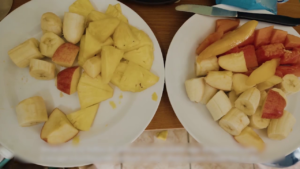 We asked a couple of the older students why its important to eat healthy.
We asked a couple of the older students why its important to eat healthy.
Paul Lopez
“What are some examples of healthy food?”

Elijah Martinez
Elijah Martinez, Student, Stella Maris School
“Orange Banana, Carrots, Lime and dende.”
Paul Lopez
“And what are some examples of unhealthy food?”
Elijah Martinez
“Sweet, fry chicken.”

Paul Lopez
“Why should kids decided to eat healthy food?”
Elijah Martinez
“To let them grow, look better and build up deh blood and so.”
Paul Lopez
“For you, how often do you eat healthy, be honest?”
 Elijah Martinez
Elijah Martinez
“Well, I eat healthy every Tuesday and Monday.”
Paul Lopez
“How about Wednesday and Thursday and Friday?”
Elijah Martinez
“Sometimes I eat healthy on Thursday and Friday.”
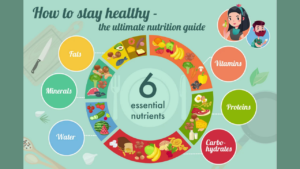 Martinez has learned to associate healthy eating with the healthy eating program implemented at his school. This is an important start to developing a lifelong healthy lifestyle.
Martinez has learned to associate healthy eating with the healthy eating program implemented at his school. This is an important start to developing a lifelong healthy lifestyle.
Paul Lopez
“Why is it important for children to eat healthy food instead of unhealthy food?”

Malique Requena
Malique Requena, Student, Stella Maris
“Because it makes you strong, when you eat your fruit and vegetables every day you eat?”
Paul Lopez
“What are some examples of healthy food?”
Malique Requena
“There are fruits, vegetables, all kind of things we need to eat.”
Their knowledge is testament to the fact that anyone can learn to differentiate between healthy and unhealthy food options to make better choices. Also, introducing these lifestyle lessons into the school system builds a healthy nutrition foundation at an early age.
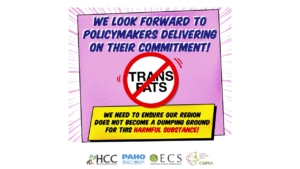 Sheree Salgado
Sheree Salgado
“You know, after a hard day of work, you come home, you tired, especially as a teacher and you have your children at home waiting for you and you just look for something easy. But, we can do easy stuff that are healthy. We just need to be more educated about it, rather than just go and grab a fry chicken and a pack bread.”
Salgado contends that teaching children healthy eating habits in schools begin with adults first understanding the body’s daily nutritional needs. In fact, there is an entire regional campaign geared towards banning a food product that is a danger to Caribbean health, trans fats.

Koleen Neal
Koleen Neal, Nutritionist, Dangriga Polyclinic
“Trans fats are an unhealthy type of fat that could lead to having high cholesterol. It is naturally produced in animals, and you could find it in dairy products. The unhealthy trans fats are industry produced.”
It goes through a process called hydrogenation which turns the liquid to solid so that the product can have a longer shelf life. Shortening and margarine butter are examples of trans fats. It can also be found in many store-bought prepackaged snacks. Ice cream also contains trans-fat.
Koleen Neal
“What makes it bad is because it solidifies at room temperature imagine what it does to your arteries. So, because it does that, it causes a blockage in the arteries. Before it does that, your levels of high cholesterol increase, which is one of the risk factors of having a heart disease.”
Paul Lopez
“Are there healthier options? Since this is solid, are liquids healthier?”
Koleen Neal
“We recommend unsaturated fats. These are liquid oils. These stay liquid at room temperature. So it is less likely to solidify or clog the arteries.”
With this knowledge in hand, Elijah gave his advice to children about eating healthy.
Elijah Martinez
“I wah tell deh, yo always have to stay healthy, eat good fruit on Wednesday and Tuesday and Thursday. And in my opinion, I suppose to eat healthy to, because that will build me up and make me better.”
Reporting for News Five, I am Paul Lopez.







Facebook Comments